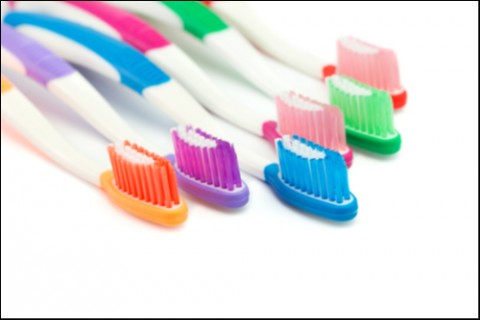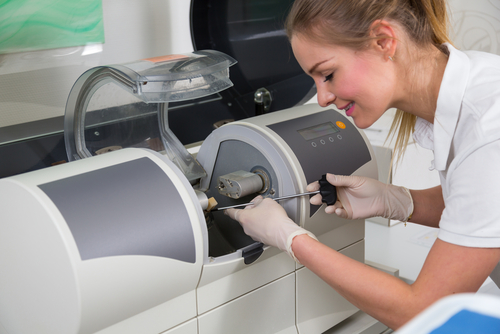 Soft bristle, hard bristle, small, medium, large, electric, manual- these are just a few of different kinds of toothbrushes consumers must decide between. But with so many choices in the toothbrush aisle, making that choice can be very overwhelming. We spoke to Dr. Gary Lederman of Bellmore, NY about how to choose the best brush for your teeth. The good news is, according to Lederman, it’s a lot easier than you think.
Soft bristle, hard bristle, small, medium, large, electric, manual- these are just a few of different kinds of toothbrushes consumers must decide between. But with so many choices in the toothbrush aisle, making that choice can be very overwhelming. We spoke to Dr. Gary Lederman of Bellmore, NY about how to choose the best brush for your teeth. The good news is, according to Lederman, it’s a lot easier than you think.
How easy? For starters, don’t worry about the bristle strength. Lederman says, "no matter the condition of your teeth, you should always choose a soft-bristled brush." Why? Well, for starters, you can do serious damage to your tooth enamel and gums with a hard bristled brush. Hard bristles can permanently scratch enamel- especially when it has been weakened following the consumption of acidic food or drinks (think wine or citrus fruits). While Lederman agrees that hard bristled brushes can be better at removing plaque than soft brushes, "the difference in performance is not enough to risk the potential damage."
As for brush size, ‘the bigger, the better’ does not apply when it comes to toothbrush heads. Smaller is actually better because it allows your brush to reach into the smaller spaces in your mouth.
And then there’s the electric vs. manual brush dilemma. Should you spring for an electric? Is it really worth the extra expense? Dr. Lederman thinks it is. "Electric brushes can be much more efficient at removing plaque than manual brushing alone. Even more effective than a hard bristled manual brush." Furthermore, says Lederman, "Many newer electric brushes have timers that won’t stop the brush motor until you’ve brushed for 2 minutes." (Two minutes is the amount of time the ADA recommends you brush your teeth at each brushing.) This timer means not only is the electric brush more efficient at removing plaque, but it will ensure you give the brush enough time to get all the plaque. Another feature of newer brushes is a pulse or beep that notifies you when it’s time to switch zones in your mouth. This ensures that you pay equal attention to each area of the mouth, and aren’t focusing too little or too much time on certain teeth.
The main complaint about electric brushes, aside from the cost of the base, is the cost of the brush heads. Some new programs are coming out that may offer a solution to this problem. One new service will sell you a relatively inexpensive brush base, and enroll you into an optional brush head replacement service, where for 6 dollars you are sent a new brush head –with free shipping- at the interval of your choice (anywhere from 1-3 months). This may act as a reminder that it’s time to replace your brush head- and offer a lower cost alternative to the expensive name-brand heads many patients balk at paying for. Another program very similar (and with similar prices) will be launching soon, and if this model works, more will undoubtedly follow. The downside to this type of plan is that the replacement heads are only available through the manufacturer, so if you were to lose one or need to replace it before your replacement head arrived, you’d be out of luck. Still, most people have a spare manual brush they could use in the interim.
If inexpensive replacement heads appeal to you, but you’re not interested in going the mail subscription route check your local warehouse club for replacement heads. Most bulk stores sell the big name brush heads in a large pack. When you break down the cost per brush head, they are actually less than these new subscription plans, and you don’t have to wait on new heads coming in the mail. Also, sites like Amazon and some discount retailers make a generic brand replacement heads that sell for a lot less than the name brand.
The hardest thing when it comes to toothbrushes is simply remembering to replace the brush. Lederman says "According to studies, the average person changes their toothbrush or brush head every nine months- which is three times longer than recommended." You should replace your brush head or your manual toothbrush every 2-3 months or sooner if you notice excessive wear on the bristles before that time.







 Dr. Lederman’s continuing education has included recent trends in dentistry that is minimally invasive or “light touch dentistry.” This approach to dentistry uses techniques and materials to treat dental restorations to sustain as much as the natural tooth as possible. Not only is it better for the tooth and patient’s long-term health, patients have a much better experience with minimally-invasive dentistry.
Dr. Lederman’s continuing education has included recent trends in dentistry that is minimally invasive or “light touch dentistry.” This approach to dentistry uses techniques and materials to treat dental restorations to sustain as much as the natural tooth as possible. Not only is it better for the tooth and patient’s long-term health, patients have a much better experience with minimally-invasive dentistry.  Dr. Lederman knows you are busy. That’s why when its time for a restoration, he uses CEREC 3D technology. With CEREC, Dr. Lederman’s patients need only one appointment for inlays, onlays, crowns and veneers. There is no longer a need for temporary crowns or a week of production time. Why make two appointments when your restoration can be completed in one!
Dr. Lederman knows you are busy. That’s why when its time for a restoration, he uses CEREC 3D technology. With CEREC, Dr. Lederman’s patients need only one appointment for inlays, onlays, crowns and veneers. There is no longer a need for temporary crowns or a week of production time. Why make two appointments when your restoration can be completed in one!  Black or grey metal fillings contain mercury and are generally considered an old and outdated technology for filling for many reasons. Dr. Lederman has not used silver, gray or metal fillings for years, instead opting for the improved dentistry of white, resin fillings.
Black or grey metal fillings contain mercury and are generally considered an old and outdated technology for filling for many reasons. Dr. Lederman has not used silver, gray or metal fillings for years, instead opting for the improved dentistry of white, resin fillings.  Dr. Lederman is a leader in bringing a biomimetic dentistry approach dentistry his patients in New York. The term “biomimetic” means to imitate or to model after nature. Applied to dentistry, Dr. Lederman follows the ideal model for dental structure: the actual tooth.
Dr. Lederman is a leader in bringing a biomimetic dentistry approach dentistry his patients in New York. The term “biomimetic” means to imitate or to model after nature. Applied to dentistry, Dr. Lederman follows the ideal model for dental structure: the actual tooth.  Dr. Lederman’s continuing education in Neuromuscular Dentistry now extends to his practice of orthodontics. As with the treatment of TMJ, Neuromuscular Dentistry addresses the alignment of both the teeth and the jaw to create an ideal, pain-free balance. Dr. Lederman’s continued study of Neuromuscular Dentistry now extends to using Orthodontics in the application of neuromuscular principles.
Dr. Lederman’s continuing education in Neuromuscular Dentistry now extends to his practice of orthodontics. As with the treatment of TMJ, Neuromuscular Dentistry addresses the alignment of both the teeth and the jaw to create an ideal, pain-free balance. Dr. Lederman’s continued study of Neuromuscular Dentistry now extends to using Orthodontics in the application of neuromuscular principles. 